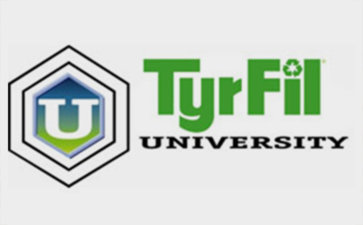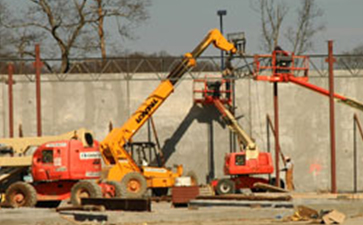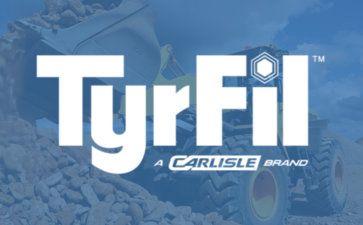The TyrFil “Hatfield vs. McCoy” Early Days
Ransom Wyman and Ed Gomberg, both credited for launching the polyurethane tire fill market, had never worked together and had never met socially, except once for lunch. But in a legal sense, they knew each other very well. Both men claim to be the first to discover the polyurethane tire-filling process, and although Gomberg was the first to obtain a patent on it, Wyman said he developed the idea while still with Indpol.
In 1968, at the request of Kaiser Steel, Wyman flatproofed some tires on a straddle crane. The tires were filled by pouring the castable urethane material into the tire casing (similar to filling a mold) and then the wheel was pressed onto the filled casing. Although the durometer of the tire was extremely hard, the tire, nevertheless, sustained no flats. Later, other tires would be flatproofed in the same manner.
In 1971, Gomberg acquired Indpol when they were having financial difficulty and turned the company around after the first year, mostly through flatproofing tires. In the seventies, sales of Off-the-Road (OTR) tires were “booming” in industries that demand a flatproofing solution. The United States Government was now heavily involved in development of the Interstate Highway System. Highways were being built in every state. In addition to the building of highways, shopping malls, housing developments, and construction sites were everywhere. Changes were also taking place in the Mining Industry. Large corporations had purchased the small mines and were now producing minerals in large quantities through strip mining and mechanized underground machinery. The poor “pick and shovel” miners in Appalachia, during the first half of the century, were now working at good wages through the use of modern equipment now on rubber tires.
Recognizing the future potential market for flatproofing, Gomberg began promoting the urethane flatproofing product. He made some improvements to its physical properties and obtained a patent on the filling process. He formed another company called Synair and began licensing the flatproofing product and process. He would use an air-driven pump to “feed” the two-part liquid into the tire casing through the valve stem.
Mr. Gomberg licensed the marketing rights of his new product to the B.F. Goodrich Tire and Rubber Co, the pioneers of the tire manufacturers that used urethane fill for the flatproofing of tires. Goodrich was the first company to promote a product that would guarantee “NO MORE FLATS!” Meanwhile, Ransome Wyman and Roger Crude, former partners at Indpol, on August 3, 1971, formed a small company called Arnco. This company also manufactured castable urethanes and their own formulation of flatproofing material.
SYNAIR and ARNCO were now in direct competition with each other although they had both sprang from the same “root”. Because of their similar backgrounds, products, and market, many lawsuits began to occur. These lawsuits would continue until the early nineties. The two companies were the targets of trade magazines and cartoonists comparing them to the “Hatfields and McCoys”. Mere mention of their names stirs up visions of a lawless and unrelenting family feud. It evokes gun-toting vigilantes hell-bent on defending their kinfolk, igniting bitter grudges that would span generations. Gomberg’s and Wyman’s threats and lawsuits brought many laughs within the tire industry.
The Battle Over Patent Rights
The first lawsuit was won by Gomberg with an out of court settlement of one million dollars. Apparently, the court found that sometime in the 1970-1980’s, ARNCO had violated Gomberg’s patent (U.S Patent 3,866,651). A second major lawsuit between the two occurred in the 1990s over ARNCO’s patented formulation of the use of water in the manufacturing process (U.S. Patent 4,416,844). The court awarded ARNCO one million dollars for the patent violation. SYNAIR, at this time, had paid, in addition to the lawsuit awards, a total of $1,000,000 in legal fees and ARNCO had paid an estimated $500,000 in their litigation costs.
While there is no love lost between the two, based on previous interviews, both said they gave little thought to the lawsuits or each other:
“I used to have pretty strong feelings about it, but I don’t anymore,” Wyman said. “I don’t hate the guy or anything. He’s a clever businessman. A lot of things I have learned about business I have learned by observing what he has done, so he is a good teacher.”
When asked how he feels about Wyman, Gomberg replied, “Indifference. I never give him a thought. There is nothing to envy. There is nothing to emulate. He has been a thorn in my side in terms of disrupting me from the path I like to follow because, periodically, I have to go into combat with this character”
SYNAIR (later became Pathway Polymers) and ARNCO remained fierce competitors in the tire flatproofing market. It wasn’t until 2013, when both were acquired by Accella Performance Materials that the feud ended, and the two companies merged together to become ArncoPathway. Although the “Hatfield and McCoy” days are long over, the stories are still shared in the industry and who really was the founder of TyrFil is still debated. But at the end of the day, both men deserve a lot of credit for making significant contributions to the OTR tire industry. The 50-year old legacy lives on and TyrFil flatproofing continues to eliminate tire flats and improve productivity in the industries it serves.


